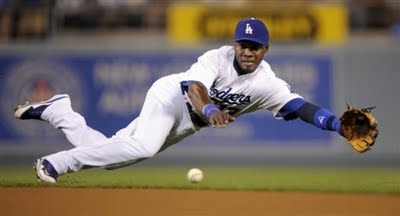February 4, 2010
Twins Sign Orlando Hudson To One-Year Deal
 I'm sometimes accused of being overly critical of the Twins' front office, but my response is usually that it can't help but look that way when my "job" here is to analyze and give opinions about their moves and the "bad" have simply outnumbered the "good" since Terry Ryan stepped down as general manager in September of 2007. In other words, Bill Smith's first 18 months on the job just didn't feature a whole lot of moves to praise.
I'm sometimes accused of being overly critical of the Twins' front office, but my response is usually that it can't help but look that way when my "job" here is to analyze and give opinions about their moves and the "bad" have simply outnumbered the "good" since Terry Ryan stepped down as general manager in September of 2007. In other words, Bill Smith's first 18 months on the job just didn't feature a whole lot of moves to praise.
He dealt Matt Garza and Jason Bartlett for Delmon Young and Brendan Harris, got a mediocre return for Johan Santana, and gave out millions to Craig Monroe, Livan Hernandez, Nick Punto, Mike Lamb, Adam Everett, Juan Rincon, and Luis Ayala. Was every move a bad one? Of course not, but the entire body of work was pretty damn ugly and I said so as the moves rolled in, without the benefit of hindsight, which understandably comes across as "overly critical" at times. But thankfully, times have changed.
Smith's second season on the job was sort of a mixed bag, but certainly included several moves worth praising, and this offseason the front office has basically been flawless from trading for J.J. Hardy and signing Jim Thome to retaining Carl Pavano and letting Orlando Cabrera leave. And now the icing on the offseason cake is inking Orlando Hudson to a one-year, $5 million deal, which in addition to simply being a very good move is also something that I've long been campaigning for in this space.
Operating under the assumption that Ron Gardenhire will do everything he can to play Punto regularly somewhere, the Twins' early moves left them with essentially one lineup opening at either second or third base. Gardenhire's tendency to use a speedy infielder as his No. 2 hitter also made it likely that one of the two guys playing those positions would slide into the lineup between Denard Span and Joe Mauer. Hudson capably checks both boxes as a good all-around second baseman and nice No. 2 bat.
Last year Twins second basemen ranked dead last in all of baseball with a combined .209/.302/.267 line, so Hudson's career .281/.348/.431 mark represents a massive upgrade and his adjusted OPS+ has actually improved in four straight seasons despite the fact that he turned 32 years old this winter. He doesn't really stand out in any one area offensively, but per 150 games Hudson usually bats around .285 with 10 homers, 50 total extra-base hits, 60 walks, and 5-10 steals. He's just a good, solid player.
Among guys who played at least 100 games at second base Hudson's adjusted OPS+ ranked 9th, 7th, 13th, and 7th during the past four seasons, so even accounting for some potential age-related decline he's likely to be among the position's top 10 hitters in 2010. He's posted an on-base percentage above .350 in each of those four seasons and is a switch-hitter with similar production from either side of the plate, both of which make him a particularly good fit in the No. 2 spot.
Hudson teams with Span to put two strong on-base threats directly in front of the lineup's big boppers and also provides a potential right-handed bat in the midst of lefties Span, Mauer, Justin Morneau, and Jason Kubel. He also gives the Twins a pretty decent chance to have above-average hitting from eight of the nine spots in the lineup, with only third base looking like a clear weak spot (assuming that Hardy bounces back). Of course, while a very good fit for the Twins at $5 million Hudson still has some flaws.
Defensively he has an excellent reputation built by winning four Gold Gloves in the past five years, but a look at some advanced metrics suggests that his range began slipping around age 28. Ultimate Zone Rating pegged Hudson as right about average defensively in both 2006 and 2007 before falling to five runs below average per 150 games between 2008-2009. In other words we'll constantly hear praise for Hudson's glove this season, but given his age and UZR numbers he's likely to be average at best.
Another potential problem area is Hudson's high ground-ball rate. He had the fourth-most grounders in baseball last year at 56 percent and is at 50 percent for his career, which along with good but not great speed and Span constantly being on first base could equal a ton of double plays. He's hit into a DP in 16.5 percent of his DP chances over the past three years. To put that in context Mauer is often criticized for frequent double plays, yet has done so in only 12.4 percent of his DP chances during that time.
So he's fairly old, not as good as his reputation defensively, and likely to hit into a bunch of DPs batting second, but let's be very clear: Hudson is an excellent acquisition in an offseason full of sound moves and represents a massive all-around upgrade over the various options the Twins could have trotted out at second base. Smith, Rob Antony, and the rest of the front office deserved any criticism they received for their 18 months on the job and now they deserve credit for what has been a fantastic offseason.
Once you're done here, check out my NBCSports.com blog and Twitter updates.

